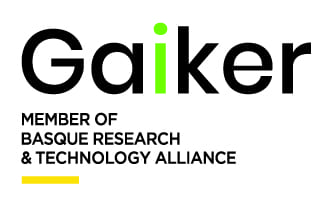NAME 3D Inprimaketazko Filamentuen Fabrikazio Unitatea

Konposatu termoplastikoen fabrikazio eta egokitze unitatea 3D inprimaketarako 1,75mm eta 2,85mm-ko diametrodun filamentu eta galauts/mikrogalauts forman. 200g eta 20Kg/egun bitarteko ahalmendun sorta esperimentalak egiteko, elastomero termoplastikodunak, material gogorrak, konposatu sendotuak, nanokonposatuak, biomaterialak eta ezaugarri termiko handiko termoplastikoak (380˚C-rainoko urtze tenperatura).
FIELDS OF APPLICATION
AM Digital Chain.
AM process validation
AM/3D Printing Process
Design for AM and Digital pre-processing
Materials for 3D/AM
Post process
Supporting technologies and processes
MOST OUTSTANDING EQUIPMENT AND COMPONENTS
-
Granulator system
GALA LPU submerged granulator system with maximum granulation flow rate of 20Kg/h and 315 ºC of maximum service temperature of the perforated plate.
-
Industrial fused filament printer 3NTR A2
Industrial fused filament printer 3NTR A2 with building heated chamber at 80 ºC degrees and dimensions of 620 x 355 x 500 mm, refrigerated extrusion head of 3 hotends (410ºC), and heated construction platform up to 135ºC.
-
Micrompounder DSM Explore
Micrompounder DSM Explore of double conical screw, with mixing chamber volumen of 15 cm3, working temperature range between 21ºC and 400ºC, shear rate between 1 and 250 rpms.
-
Pilot extrusion line
Pilot extrusion line with nozzles to make filaments of 1.75 and 2.85 mm diameter and pellets, with a twin-screw extruder Leisbtriz Mico 27 GL, and a single-screw extruder Iqap Lap of 30 mm, Brabender gravimetric feeders, cooling system with water bath or air blow, and winding system.
-
Single extruder
Single extruder Haake Rheocord-Rheomex of 19 mm diameter with Haake Polylab torque rheometer, and nozzle for 1.75mm filament.
SERVICES OFFERED BY THE ASSET
Design and product development through FFF / FDM technology
Design and manufacturing models, parts, inserts and tools through 3D printing with FDM technology. Development and evaluation of printed molds in processes of thermoplastics and composites transformation.
Development of new 3D printing polymeric materials
Customized formulation of pellets and filaments of 3D printing of 1.75 mm and 2.85 mm of diameter. Adaptation of thermoplastic compounds in 3D printing filaments. Definition of product and process technical sheets. Determination of the qualitative and quantitative composition of 3D printing materials.
Evaluation of emissions toxicity
Study of in vitro toxicity and ex vivo models (digestive tract, lung, heart, brain ...) of nanoparticle emissions (collected in situ) in 3D printing processes. Preparation of protocols.
Optimization of process parameters
Optimum adjustment of the process parameters, and chemical, morphological, physical, microstructural, mechanical and fire behavior according to standards (ISO, UNE, ASTM, DIN, BS). Application of post-treatments and elaboration of processes guides and 3D printing protocols for materials and final parts.
Sustainability and recyclability evaluation
Evaluation of the additive manufacturing process sustainability through Life Cycle Analysis (LCA), environmental and economic methodologies. Development and implementation of recycling systems.
ENTITY MANAGING THE ASSET

Contact person:
José Luis Gómez Alonso
gomez@gaiker.es